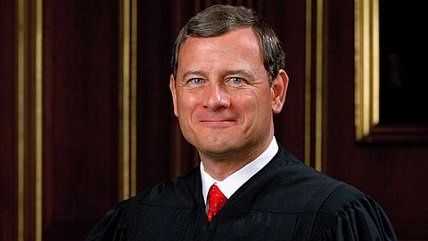Supreme Court Resigns Duties, Tortures English Language to Save Obamacare
Judicial restraint? More like judicial hysterical appeasement.


In his 1946 essay, Politics and the English Language, George Orwell observed that "the slovenliness of our language makes it easier for us to have foolish thoughts." Today is Orwell's birthday; it's also the day the Supreme Court released its 6-3 decision in King v. Burwell, which preserves the Affordable Care Act at the expense of plain English.
The majority, led by Chief Justice John Roberts, ruled that the provision of the law mandating an "Exchange established by the State" should be interpreted to include an Exchange not established by any state, but instead by an agency of the federal government, the U.S. Health and Human Services Department.
In his spot-on dissent, Associate Justice Antonin Scalia explains why this is an "impossible possibility":
The Court holds that when the Patient Protection and Affordable Care Act says "Exchange established by the State" it means "Exchange established by the State or the Federal Government." That is of course quite absurd, and the Court's 21 pages of explanation make it no less so. …
Faced with overwhelming confirmation that "Exchange established by the State" means what it looks like it means, the Court comes up with argument after feeble argument to support its contrary interpretation. None of its tries comes close to establishing the implausible conclusion that Congress used "by the State" to mean "by the State or not by the State."
The majority opinion explains away this blatant contradiction by expressing confidence that architects of the law intended something other than what they wrote—the opposite of it, in fact. Intent should trump plain English—even when the two directly oppose each other—writes Roberts, because the Court's job is to defer to the will of lawmakers, and even contort logic to assist them, "if at all possible":
In a democracy, the power to make the law rests with those chosen by the people. Our role is more confined—"to say what the law is." Marbury v. Madison, 1 Cranch 137, 177 (1803). That is easier in some cases than in others. But in every case we must respect the role of the Legislature, and take care not to undo what it has done. A fair reading of legislation demands a fair understanding of the legislative plan.
Congress passed the Affordable Care Act to improve health insurance markets, not to destroy them. If at all possible, we must interpret the Act in a way that is consistent with the former, and avoids the latter. Section 36B can fairly be read consistent with what we see as Congress's plan, and that is the reading we adopt.
If only there was some branch of government designed to review legislative actions, thwarting the intentions of Congress if they conflict with the law… oh, wait, that branch does exist: it's the Supreme Court! The King v. Burwell decision is not merely the exercise of judicial restraint; this is judicial hysterical appeasement.
Supporters of Obamacare are excited about this outcome, as expected. The Huffington Post crooned, "Supreme Court Rejects Obamacare Lawsuit, Preserving Insurance for Millions." (Preserving insurance for some millions, no doubt, while depriving others of insurance—what about all the people who were kicked off their plans because of Obamacare-related complications?) Certainly, reasonable people can disagree about whether Obamacare is, on balance, a good law, and improves upon the dreadful state of the U.S. healthcare regime. But it's vexing to see so many liberals cheering the utter death of the Court's ability to rebuke lawmakers when they put forth nonsensical laws. Roberts' decision gives a lot more power to Congress, obligating the Court to ignore the plain text of laws "if at all possible."
Well, anything is possible. Is the preservation of limited government so universally unimportant—and the protection of Obamacare so paramount—that it was worth the utter subjugation of the Court (hereafter known as the Legislative Subcommittee on Wording Tweaks) to the will of Congress?
More from Reason on the King v. Burwell ruling here and here.


Show Comments (75)